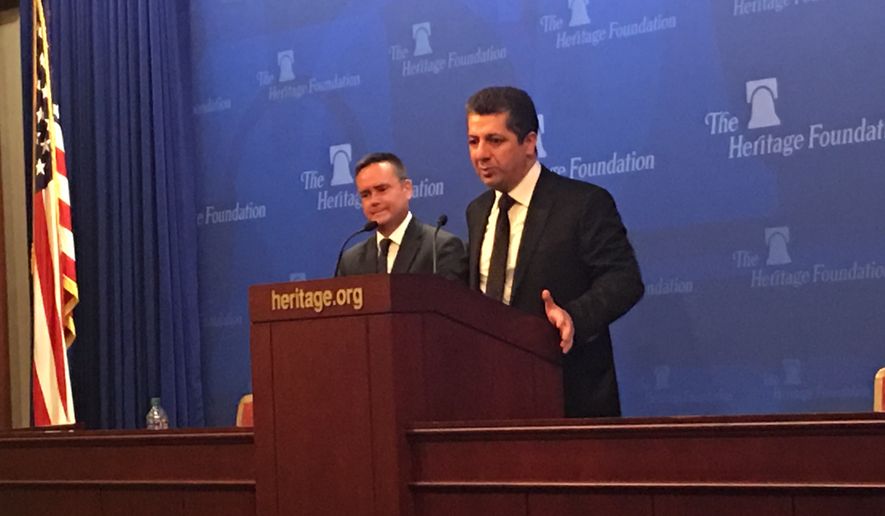A top Iraqi Kurdish leader said Tuesday that a referendum on the region’s independence could happen by the end of this year and would also include the population of the multi-ethnic and oil-rich province of Kirkuk.
The political future of the Kurds is again emerging as a potentially divisive issue as Iraqi forces backed by the U.S. make slow but steady progress to oust Islamic State from the jihadi group’s last major stronghold in the city of Mosul.
“We intend to actually conduct this referendum toward the end of this year,” Masrour Barzani, chancellor of the Kurdistan Regional Security Council, told a Heritage Foundation audience on a Washington visit. The council oversees the internal security operations of the Kurdish enclave in Iraq, and it has been a key partner in the U.S.-led coalition push against Islamic State.
Iraqi Prime Minister Haider al-Abadi insisted late last month that any referendum on Kurdish independence should be conducted by Baghdad, telling reporters in Baghdad that a Kurdish-run vote “is not in the interest of the Kurds economically, politically and nationally.” An al-Abadi adviser said last week Mr. al-Abadi still had not agreed even to hold a referendum.
Mr. Barzani, son of Kurdistan Region President Masoud Barzani, said the referendum was intended to get an accurate representation of the will of the people, denying the vote would be used as leverage for any one political party in the Iraq’s Kurdish region.
“It’s a very serious issue, it’s not for any propaganda,” he said.
Mr. Barzani said only the “original inhabitants” of the ethnically divided city of Kirkuk, which the Kurds see as a future capital, can have a say in the future of the city.
“Those people would be qualified to participate in the referendum that are original inhabitants of that province. So we cannot have people from outside in either way to make decisions on behalf of Kirkuk,” said Mr. Barzani.
Kirkuk province is under the jurisdiction of the central Iraqi government, although it is led by a Kurdish government. The area is estimated to hold 4 percent of the world’s oil reserves. In the 1970s Saddam Hussein sought to change the demographic of the province by deporting native Kurd, Turkmen and Christian populations, replacing them with Arabs and redrawing the boundaries of the province.
“It’s our firm belief that the population and the percentage of the Kurdish people will be very obvious and more than 70 percent,” Mr. Barzani said, citing the majority needed under Iraq’s 2005 constitution.
The Kurdish leader accused the Iraqi government of ulterior motives in not implementing the terms of the article.
“So there is a reason why it’s not implemented. If there is a will, there is a way. Unfortunately, Iraq has many, many years since the constitution was ratified until now, and it is not implemented,” he said.
The battlefield successes of the Kurdish peshmerga fighters have given Mr. Barzani and other Kurdish leaders greater leverage to demand political changes once the Islamic State threat is ended in Iraq.
“It was the peshmerga that actually defended Kirkuk and did not let Kirkuk be taken by ISIS the way that Mosul was taken by ISIS. So we do believe that the identity of Kirkuk is very clear,” he said, using an acronym for Islamic State.
Mr. Barzani stressed there was still time for diplomacy with Baghdad over the future of Kirkuk, but said, ultimately, that the will of the people should be respected.
“We also hope that we can reach an understanding with Baghdad, but, more importantly, with the people of Kirkuk to make a decision about the fate of the province,” he said.
• Laura Kelly can be reached at lkelly@washingtontimes.com.




Please read our comment policy before commenting.